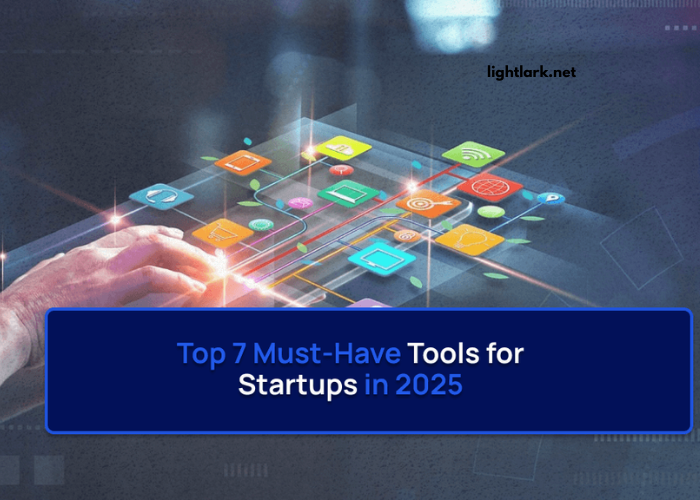In 2025, technology continues to evolve at a rapid pace, presenting new opportunities and challenges for businesses. In an era of digitization, organizations are increasingly relying on advanced tools and technologies to drive efficiency, productivity, and success. From artificial intelligence (AI) to blockchain, cloud computing, and data analytics, the modern business landscape is shaped by innovations that enable companies to stay ahead of the competition. This article explores the key technologies that are set to revolutionize business operations in 2025 and how organizations can leverage these tools to gain a competitive edge.
The Role of Technology in Business Growth
Technology has become the backbone of modern business. With digital transformation taking center stage, companies in all sectors are adopting innovative technologies to streamline processes, improve customer experiences, and boost profitability. In 2025, businesses that fail to incorporate cutting-edge technologies risk falling behind their competitors.
From small startups to large enterprises, organizations are leveraging digital tools to automate routine tasks, enhance decision-making, and optimize their operations. As the business world becomes increasingly interconnected, staying ahead in terms of technological advancements is critical for growth and long-term success.
Key Technologies for Business Success in 2025
1. Artificial Intelligence (AI) and Machine Learning (ML)
Artificial Intelligence (AI) and Machine Learning (ML) have already made significant strides in business, and by 2025, these technologies will be even more integrated into various business processes. AI-powered tools will enable companies to analyze large sets of data, identify patterns, and make data-driven decisions. ML algorithms can improve processes such as customer segmentation, fraud detection, inventory management, and predictive analytics.
How AI and ML Can Drive Success:
- Personalized Customer Experiences: AI and ML allow businesses to create tailored experiences for customers. By analyzing customer data, AI can help deliver personalized recommendations, improving customer satisfaction and loyalty.
- Automation of Routine Tasks: AI-powered chatbots and virtual assistants can handle customer inquiries, reducing the need for human intervention and allowing employees to focus on more complex tasks.
- Improved Decision-Making: With the help of AI and ML, companies can analyze real-time data and derive insights that support better decision-making, leading to smarter strategies and optimized business processes.
2. Cloud Computing
Cloud computing has revolutionized the way businesses store, manage, and access data. In 2025, cloud-based solutions will continue to drive efficiency, scalability, and flexibility for organizations. With cloud infrastructure, businesses can access resources and applications on-demand, reducing the need for expensive on-premises hardware and IT maintenance.
How Cloud Computing Enhances Business Operations:
- Cost-Effective Scalability: Cloud solutions allow businesses to scale their operations without incurring high upfront costs. Resources can be increased or decreased based on demand, ensuring cost-effective growth.
- Remote Work Enablement: Cloud platforms enable businesses to adopt remote work models, providing employees with secure access to files and applications from any location. This enhances productivity and work-life balance.
- Data Security and Backup: Cloud services provide secure data storage and backup options, ensuring that business-critical data is protected from cyber threats and physical damage.
3. Blockchain Technology
Blockchain technology has gained significant attention in recent years, particularly in industries such as finance, healthcare, and supply chain management. In 2025, blockchain will continue to reshape how businesses manage transactions, verify authenticity, and ensure data integrity.
How Blockchain Drives Business Success:
- Increased Transparency: Blockchain offers decentralized and transparent record-keeping, allowing businesses to track every transaction in real-time. This is particularly beneficial in industries like supply chain management, where transparency is essential.
- Enhanced Security: Blockchain’s cryptographic security features make it virtually impossible for hackers to alter or forge data. This is especially valuable for businesses dealing with sensitive information, such as financial institutions and healthcare providers.
- Improved Efficiency in Transactions: Blockchain enables faster and more secure transactions, reducing the need for intermediaries and minimizing transaction costs.
4. Data Analytics and Business Intelligence
Data has become one of the most valuable assets for businesses in the digital age. By 2025, businesses will rely even more on data analytics and business intelligence (BI) tools to unlock insights that drive strategic decisions. Big data, combined with advanced analytics, allows organizations to understand consumer behavior, market trends, and operational inefficiencies.
How Data Analytics and BI Contribute to Success:
- Informed Decision-Making: By analyzing historical and real-time data, companies can make informed decisions that align with market demand, customer preferences, and operational efficiency.
- Predictive Analytics: Predictive analytics enables businesses to forecast future trends and customer behaviors, helping them stay ahead of market shifts and make proactive decisions.
- Operational Optimization: Data analytics helps businesses identify inefficiencies in their operations, from supply chain management to employee productivity. By addressing these inefficiencies, companies can reduce costs and improve profitability.
5. Internet of Things (IoT)
The Internet of Things (IoT) refers to the network of interconnected devices that communicate and share data. By 2025, IoT will be instrumental in driving innovation across various industries, from manufacturing to healthcare, logistics, and retail.
How IoT Benefits Businesses:
- Real-Time Monitoring and Insights: IoT sensors provide businesses with real-time data on everything from equipment performance to inventory levels. This enables companies to make data-driven decisions and respond quickly to changing conditions.
- Enhanced Customer Experience: IoT devices, such as smart products and wearables, allow businesses to offer more personalized and responsive customer experiences. For example, retailers can use IoT to track customer behavior and recommend products in real-time.
- Improved Supply Chain Management: IoT enables businesses to track the movement of goods and materials throughout the supply chain. This helps optimize inventory management, reduce delays, and improve operational efficiency.
6. Virtual Reality (VR) and Augmented Reality (AR)
Virtual Reality (VR) and Augmented Reality (AR) are poised to transform the way businesses interact with customers, provide training, and enhance product development. By 2025, VR and AR technologies will become more accessible and integrated into business operations.
How VR and AR Drive Business Success:
- Immersive Customer Experiences: VR and AR allow businesses to create immersive experiences for customers, whether it’s virtual product demonstrations or interactive storefronts. This enhances customer engagement and boosts brand loyalty.
- Training and Development: VR and AR provide businesses with a safe and cost-effective way to train employees. For example, manufacturing companies can use VR simulations to train workers on complex machinery without the risks associated with hands-on training.
- Product Visualization: AR allows customers to visualize products in real-life settings before making a purchase. For example, furniture retailers can use AR to let customers see how a piece of furniture would look in their home.
7. 5G Connectivity
The rollout of 5G networks is expected to significantly impact businesses in 2025. With faster internet speeds, lower latency, and improved network capacity, 5G will unlock new opportunities for innovation and growth.
How 5G Enhances Business Success:
- Faster Data Transfer: 5G enables faster communication and data transfer, allowing businesses to leverage real-time data for decision-making and improve customer experiences.
- Enhanced Remote Work: With 5G, remote workers can access cloud-based applications and data more efficiently, ensuring productivity and collaboration even in remote locations.
- Smart Device Integration: 5G will support the growth of connected devices, enabling businesses to implement smart solutions in industries such as healthcare, logistics, and transportation.
Leveraging Technology for Competitive Advantage
To fully capitalize on the potential of these technologies, businesses must take a strategic approach to digital transformation. The key to success lies in selecting the right tools, integrating them into existing systems, and continuously adapting to new technological advancements.
1. Invest in Employee Training
As new technologies emerge, it’s essential for businesses to invest in employee training and development. Ensuring that employees are proficient in using AI, data analytics, cloud platforms, and other advanced tools will enable organizations to fully harness the potential of these technologies.
2. Adopt an Agile Mindset
The rapid pace of technological innovation requires businesses to be agile and flexible. By adopting agile methodologies, organizations can quickly respond to changes in the market and technology landscape. This adaptability is crucial for maintaining a competitive edge in the ever-evolving business world.
3. Foster a Culture of Innovation
Innovation is at the heart of technological advancement. Businesses that foster a culture of innovation, where employees are encouraged to experiment with new ideas and technologies, are more likely to stay ahead of the competition.
4. Focus on Cybersecurity
As businesses increasingly rely on digital tools and data, cybersecurity becomes a top priority. Implementing robust security measures, such as encryption, multi-factor authentication, and regular security audits, will protect business data and prevent cyberattacks.
Conclusion
The business landscape of 2025 will be shaped by an array of advanced technologies, including AI, cloud computing, blockchain, IoT, and more. Companies that embrace these innovations and integrate them into their operations will be well-positioned for long-term success. By leveraging the right tools, fostering a culture of innovation, and investing in employee development, businesses can thrive in an increasingly digital world. The future of business is undoubtedly tied to technology, and those who adapt quickly and strategically will lead the way to success.





